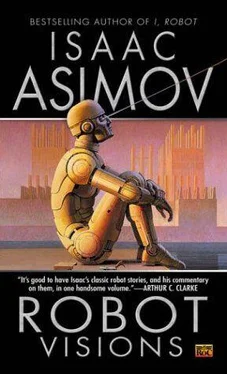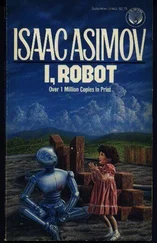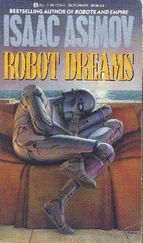Isaac Asimov - Robot Visions
Здесь есть возможность читать онлайн «Isaac Asimov - Robot Visions» весь текст электронной книги совершенно бесплатно (целиком полную версию без сокращений). В некоторых случаях можно слушать аудио, скачать через торрент в формате fb2 и присутствует краткое содержание. Жанр: Фантастика и фэнтези, на английском языке. Описание произведения, (предисловие) а так же отзывы посетителей доступны на портале библиотеки ЛибКат.
- Название:Robot Visions
- Автор:
- Жанр:
- Год:неизвестен
- ISBN:нет данных
- Рейтинг книги:5 / 5. Голосов: 1
-
Избранное:Добавить в избранное
- Отзывы:
-
Ваша оценка:
- 100
- 1
- 2
- 3
- 4
- 5
Robot Visions: краткое содержание, описание и аннотация
Предлагаем к чтению аннотацию, описание, краткое содержание или предисловие (зависит от того, что написал сам автор книги «Robot Visions»). Если вы не нашли необходимую информацию о книге — напишите в комментариях, мы постараемся отыскать её.
Robot Visions — читать онлайн бесплатно полную книгу (весь текст) целиком
Ниже представлен текст книги, разбитый по страницам. Система сохранения места последней прочитанной страницы, позволяет с удобством читать онлайн бесплатно книгу «Robot Visions», без необходимости каждый раз заново искать на чём Вы остановились. Поставьте закладку, и сможете в любой момент перейти на страницу, на которой закончили чтение.
Интервал:
Закладка:
What made the briefing even longer lay in the fact that one Temporalist after another would remember a new difficulty. Thus, one of them said suddenly, “How much do you think the language will have changed in two centuries?”
Naturally, there was no answer to that and a great debate grew as to whether there might be no chance of communication whatever, that Archie would neither understand nor make himself understood.
Finally, one Temporalist said, rather curtly, “See here, the English language has been becoming ever more nearly universal for several centuries and that is sure to continue for two more. Nor has it changed significantly in the last two hundred years, so why should it do so in the next two hundred? Even if it has, there are bound to be scholars who would be able to speak what they might call ‘ancient English. ‘ And even if there were not, Archie would still be able to make useful observations. Determining whether a functioning society exists does not necessarily require talk.”
Other problems arose. What if he found himself facing hostility? What if the people of the future found and destroyed the machine, either out of malevolence or ignorance?
One Temporalist said, “It might be wise to design a Temporal engine so miniaturized that it could be carried in one’s clothing. Under such conditions one could at any time leave a dangerous position very quickly.”
“Even if it were possible at all,” snapped another, “it would probably take so long to design so miniaturized a machine that we-or rather our successors-would reach a time two centuries hence without the necessity of using a machine at all. No, if an accident of some sort takes place, Archie simply won’t return and we’ll just have to try again.”
This was said with Archie present, but that didn’t matter, of course. Archie could contemplate being marooned in time, or even his own destruction, with equanimity, provided he were following orders. The Second Law of Robotics, which makes it necessary for a robot to follow orders, takes precedence over the Third, which makes it necessary for him to protect his own existence.
In the end, of course, all had been said, and no one could any longer think of a warning, or an objection, or a possibility that had not been thoroughly aired.
Archie repeated all he had been told with robotic calmness and precision, and the next step was to teach him how to use the machine. And he learned that, too, with robotic calmness and precision.
You must understand that the general public did not know, at that time, that time-travel was being investigated. It was not an expensive project as long as it was a matter of working on theory, but experimental work had punished the budget and was bound to punish it still more. This was most uncomfortable for scientists engaged in an endeavor that seemed totally “blue-sky.”
If there was a large failure, given the state of the public purse, there would be a loud outcry on the part of the people, and the project might be doomed. The Temporalists all agreed, without even the necessity of debate, that only success could be reported, and that until such a success was recorded, the public would have to learn very little, if anything at all. And so this experiment, the crucial one, was heart-stopping for everyone.
We gathered at an isolated spot of the semi-desert, an artfully protected area given over to Project Four. (Even the name was intended to give no real hint of the nature of the work, but it always struck me that most people thought of time as a kind of fourth dimension and that someone ought therefore guess what we were doing. Yet no one ever did, to my knowledge.)
Then, at a certain moment, at which time there was a great deal of breath-holding, Archie, inside the machine, raised one hand to signify he was about to make his move. Half a breath later-if anyone had been breathing-the machine flickered.
It was a very rapid flicker. I wasn’t sure that I had observed it. It seemed to me that I had merely assumed it ought to flicker, if it returned to nearly the instant at which it left-and I saw what I was convinced I ought to see. I meant to ask the others if they, too, had seen a flicker, but I always hesitated to address them unless they spoke to me first. They were very important people, and I was merely-but I’ve said that. Then, too, in the excitement of questioning Archie, I forgot the matter of the flicker. It wasn’t at all important.
So brief an interval was there between leaving and returning that we might well have thought that he hadn’t left at all, but there was no question of that. The machine had definitely deteriorated. It had simply faded.
Nor was Archie, on emerging from the machine, much better off. He was not the same Archie that had entered that machine. There was a shopworn look about him, a dullness to his finish, a slight unevenness to his surface where he might have undergone collisions, an odd manner in the way he looked about as though he were re-experiencing an almost forgotten scene. I doubt that there was a single person there who felt for one moment that Archie had not been absent, as far as his own sensation of time was concerned, for a long interval.
In fact, the first question he was asked was, “How long have you been away?”
Archie said, “Five years, sir. It was a time interval that had been mentioned in my instructions and I wished to do a thorough job.”
“Come, that’s a hopeful fact,” said one Temporalist. “If the world were a mass of destruction, surely it would not have taken five years to gather that fact.“
And yet not one of them dared say: well, Archie, was the Earth a mass of destruction?
They waited for him to speak, and for a while, he also waited, with robotic politeness, for them to ask. After a while, however, Archie’s need to obey orders, by reporting his observations, overcame whatever there was in his positronic circuits that made it necessary for him to seem polite.
Archie said, “ All was well on the Earth of the future. The social structure was intact and working well.”
“Intact and working well?” said one Temporalist, acting as though he were shocked at so heretical a notion. “Everywhere?”
“The inhabitants of the world were most kind. They took me to every part of the globe. All was prosperous and peaceful.”
The Temporalists looked at each other. It seemed easier for them to believe that Archie was wrong, or mistaken, than that the Earth of the future was prosperous and peaceful. It had seemed to me always that, despite all optimistic statements to the contrary, it was taken almost as an article of faith, that Earth was on the point of social, economic, and, perhaps, even physical destruction.
They began to question him thoroughly. One shouted, “What about the forests? They’re almost gone.”
“There was a huge project,” said Archie, “for the reforestation of the land, sir. Wilderness has been restored where possible. Genetic engineering has been used imaginatively to restore wildlife where related species existed in zoos or as pets. Pollution is a thing of the past. The world of 2230 is a world of natural peace and beauty.”
“You are sure of all this?” asked a Temporalist.
“No spot on Earth was kept secret. I was shown all I asked to see.”
Another Temporalist said, with sudden severity, “ Archie, listen to me. It may be that you have seen a ruined Earth, but hesitate to tell us this for fear we will be driven to despair and suicide. In your eagerness to do us no harm, you may be lying to us. This must not happen, Archie. You must tell us the truth.”
Archie said, calmly, “I am telling the truth, sir. If I were lying, no matter what my motive for it might be, my positronic potentials would be in an abnormal state. That could be tested.”
Читать дальшеИнтервал:
Закладка:
Похожие книги на «Robot Visions»
Представляем Вашему вниманию похожие книги на «Robot Visions» списком для выбора. Мы отобрали схожую по названию и смыслу литературу в надежде предоставить читателям больше вариантов отыскать новые, интересные, ещё непрочитанные произведения.
Обсуждение, отзывы о книге «Robot Visions» и просто собственные мнения читателей. Оставьте ваши комментарии, напишите, что Вы думаете о произведении, его смысле или главных героях. Укажите что конкретно понравилось, а что нет, и почему Вы так считаете.








